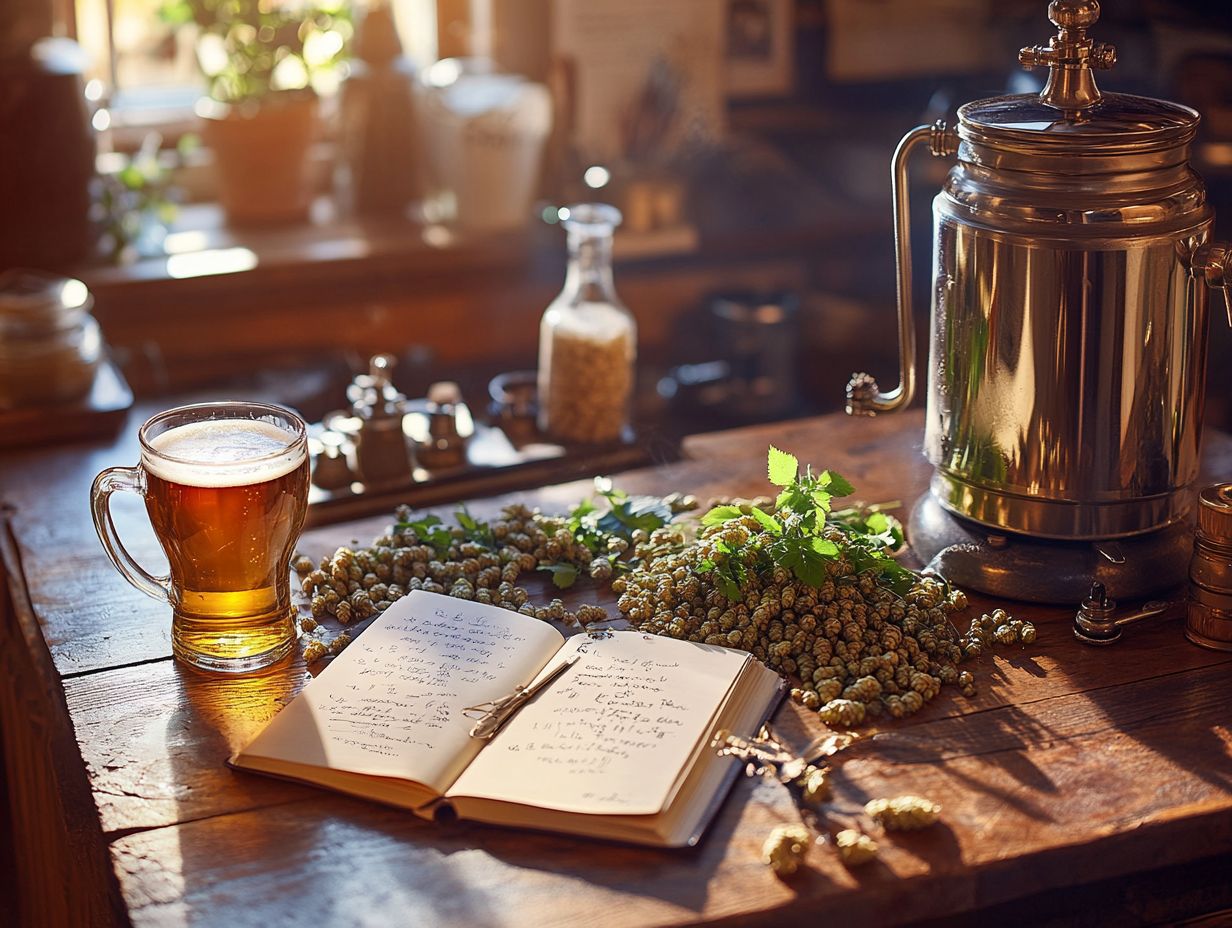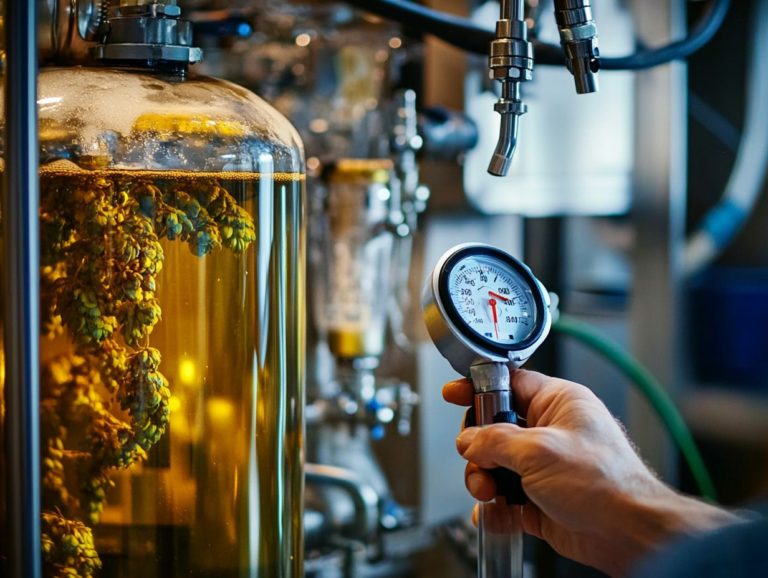Tips for Finding Your Signature Home Brew
Creating a signature homebrew is an exciting experience that invites you to express your unique taste and creativity. This article delves into the essence of what a signature brew truly is, the compelling reasons to craft your own, and the key quality ingredients that elevate your brew to an exceptional flavor profile.
You ll uncover practical brewing tips for experimenting with your processes, refining your beer recipes, and sharing your remarkable creation with friends and family. Whether you re a seasoned homebrewer or a novice stepping into this brewing hobby, you ll find ample inspiration to brew something that is genuinely personal and reflective of your unique style.

Contents
- Key Takeaways:
- What Is a Signature Home Brew?
- Why Should You Have a Signature Home Brew?
- What Makes a Good Signature Home Brew?
- Homebrewing Tips
- How to Find Your Signature Home Brew?
- Tips for Perfecting Your Signature Home Brew
- How to Share Your Signature Home Brew with Others?
- Frequently Asked Questions
- What are some tips for finding my signature home brew?
- How important is using high-quality ingredients in my signature home brew?
- Can I create a signature home brew without expensive equipment?
- What role does water play in creating a signature home brew?
- How can I make my signature home brew stand out from others?
- Is it possible to create a signature home brew that appeals to a wide range of tastes?
Key Takeaways:
- Experiment with different brewing ingredients to find your unique flavor profile.
- Continuously refine your beer recipes and don’t be afraid to try new brewing techniques.
- Share your signature homebrew with others through beer tasting parties, competitions like the National Homebrew Competition, and gifting to friends and family.
What Is a Signature Home Brew?
A signature homebrew is more than just a drink; it s a reflection of your unique artistry and passion for creating exceptional craft beer. This signature brew showcases your careful selection of high-quality ingredients malt, hops, and yeast all harmonized with distinct brewing techniques designed to unlock specific flavors and aromas.
By mastering the intricacies of the brewing process, including fermentation time and carbonation, you craft a signature brew that distinguishes itself in the burgeoning craft beer community. With each sip, you deliver a taste of innovation and creativity that resonates with fellow craft beer lovers.
Why Should You Have a Signature Home Brew?
Crafting a signature homebrew showcases your brewing skills and gives craft beer lovers a unique offering that embodies your personal taste preferences. In the vibrant brewing community, a signature brew can significantly enhance your reputation as a homebrewer and serve as an engaging conversation starter at beer tastings or taproom events.
Featuring your signature brew at these events can also help build connections with local breweries and brewing companies. This allows you to experiment with different brewing techniques, gleaning valuable insights from the feedback of fellow craft beer enthusiasts, all while contributing to the rich tapestry of local breweries and the larger brewing industry.
What Makes a Good Signature Home Brew?
A distinguished signature home brew is defined by the exceptional quality of its ingredients, which harmoniously blend to craft a unique flavor profile that reflects your personal touch as a homebrewer. Achieving this quality requires meticulous selection of malt, hops, and yeast.
Along with the application of refined brewing techniques that elevate the entire brewing process, the use of clean equipment is crucial to ensure that no unwanted flavors contaminate your brew. The fermentation stage is particularly vital in shaping the beer’s character; different fermentation methods can yield a remarkable variety of beer styles, providing you with the perfect canvas to experiment and unleash your creative expression.
Utilizing unique fermentation techniques can help develop distinct beer profiles that stand out in the brewing community.
Homebrewing Tips
1. Quality Ingredients
Quality ingredients form the backbone of any remarkable homebrew. They profoundly affect the final flavor and aroma of your beer.
By carefully selecting the right malt, hops, and yeast, you shape the overall character of your brew. This approach helps achieve that perfect balance of alcohol content and mouthfeel.
The freshness and sourcing of these ingredients are vital to ensuring a successful brewing process and delivering delightful taste satisfaction. Always keep in mind that your brewing equipment should be clean to avoid any potential contamination.
Different types of malt can impart a range of sweetness and color. Hops can introduce unique bitterness and aromatic attributes that elevate your drinking experience.
Yeast plays its own pivotal role in fermentation. It can infuse distinct fruity or spicy notes based on the strain you choose. Utilizing yeast from reputable companies like White Labs and Wyeast can significantly enhance the quality of your brew.
To enhance this diversity, consider sourcing high-quality ingredients from local suppliers. Not only does this support your community, but it also guarantees that each brew you create is both distinctive and fresh.
When selecting these components, seek out suppliers who offer detailed insights into their sourcing and product quality. This approach will enrich your entire brewing journey and lead to more vibrant, flavorful homebrews.
Engaging with local craft breweries can also provide inspiration and potential collaborations. Why not make your next brew a masterpiece that everyone will rave about?
2. Unique Flavor Profile
A unique flavor profile sets your signature homebrew apart from the rest. This is often crafted through innovative fermentation techniques and skilled brewing practices.
By experimenting with various beer styles and brewing ingredients, you can create distinctive flavors that truly resonate with your personal taste preferences. This creative journey allows you to develop seasonal brews or signature recipes that showcase your individual flair and expertise.
Understanding the importance of ingredient selection is essential, as your choice of malt, hops, and yeast can dramatically influence the flavor outcomes. Adjusting fermentation temperatures and times can lead to unexpected taste profiles, making each batch a delightful surprise.
The art of homebrewing is deeply personal. It invites you to tap into your unique preferences while considering what might appeal to a wider audience.
Engaging in taste tests or community exchanges enables you to gather valuable feedback and refine your recipes. This practice ultimately helps craft beers that not only reflect your individuality but also satisfy the diverse palates of your fellow beer enthusiasts.
Participating in events like the Beer Judge Certification Program can also provide structured feedback on your brews.
How to Find Your Signature Home Brew?
Embarking on the quest for your signature homebrew is an exhilarating adventure. Are you ready to experiment with different ingredients and brewing techniques to uncover what truly delights your palate?
This journey encourages you to explore different beer recipes and styles. As you do, you will hone your brewing skills and gain a deeper appreciation for the intricacies of the brewing process.
By engaging with the vibrant brewing community and drawing inspiration from fellow enthusiasts, you can elevate your exploration. This will guide you toward crafting a brew that is unmistakably your own.
1. Experiment with Different Ingredients to Find Your Brew
Experimenting with different ingredients is crucial for uncovering your signature homebrew. It allows you to explore a variety of quality ingredients and understand how they interact during the brewing process.
Whether you opt for unique malt blends, diverse hop varieties, or different yeast strains, each choice can profoundly influence the resulting beer styles and flavors. This journey is not just enjoyable; it s also enlightening and deepens your appreciation for the intricacies of brewing.
To truly reap the rewards of this exploration, consider brewing small test batches. These allow you to refine your techniques without the pressure of committing to a large quantity.
Keeping careful notes on every alteration such as proportions and brewing methods can prove invaluable when evaluating what works best for you. Tools like BeerSmith can also aid in the documentation and refinement of your recipes.
By tracking the outcomes and flavor developments, you can identify patterns and make informed decisions for future batches. Embracing this adventurous approach not only enriches your brewing experience but also opens the door to creating a unique brew that embodies your personal taste and creativity.
3. Personal Touch

Adding a personal touch to your signature homebrew is essential; it highlights your unique brewing journey and resonates with fellow craft beer enthusiasts who crave authentic experiences.
Consider developing specific recipes that feature special ingredients, techniques, or even local flavors that reflect your community. This approach not only enhances your brewing expertise but also allows for unique offerings that stand out in the market.
Engaging with the brewing community can yield invaluable feedback and spark further recipe refinement, allowing you to elevate your craft and share your story through your brew. Joining local brewing groups or forums like BeerMenus.com run by Will Stephens can offer additional support and resources.
When you infuse your creations with personal anecdotes and meaningful choices whether it s a cherished family recipe passed down through the generations or a local hop variety sourced from a nearby farm you re not just crafting a drink; you re creating an experience that truly speaks to the heart. Incorporating seasonal brews can also provide a unique touch to your offerings.
Every sip has the potential to tell a story, whether it s about the method behind the madness or the inspiring individuals who fueled your creativity.
By joining local brewing groups or participating in online forums, you can exchange ideas, showcase your own brews, and cultivate a sense of belonging that deepens your passion for craft beer. This vibrant exchange fosters innovation and strengthens bonds within the community, transforming every brew into a shared journey.
Companies like Sam Adams, Saranac, Dogfish Head, Founders, and Six Point can serve as excellent sources of inspiration for your brewing journey.
2. Draw Inspiration from Other Brews
Finding inspiration from other brews can truly ignite your creativity and lead you to unearth your signature homebrew. It opens the door to a world of craft beer recipes and brewing styles just waiting for you to explore.
By visiting local craft breweries and attending beer tastings, you can join the lively brewing community and gather invaluable insights that can seamlessly adapt into your own homebrewing. Observing unique offerings from fellow brewers encourages experimentation with new ingredients and techniques in your brewing process. Engaging with brewmasters like those at Evil Twin can also provide advanced brewing insights.
As you actively participate in these events, you ll encounter a rich tapestry of flavors, aromas, and techniques that can spark innovative ideas. Be sure to jot down notes on what excites your senses during these experiences. Documented inspirations can serve as a launchpad for your brewing experiments, enabling you to blend traditional methods with your unique flair.
Exploring diverse beer styles and innovative brewing techniques can further enhance your brewing journey. Connect with local brewers, immerse yourself in their craft, and allow those discoveries to shape your brewing adventure. The journey awaits, and your next great brew could be just around the corner. Visiting local breweries and engaging in taproom events can provide additional insights and inspiration for your homebrewing hobby.
3. Consider Your Taste Preferences in Craft Beer
When developing your signature homebrew, considering your taste preferences is essential. Your preferences will guide your selection of ingredients, beer styles, and overall brewing process. Reflecting on what you enjoy most in commercial craft beers, such as those from Sam Adams, Dogfish Head, and Founders, can illuminate the flavor profiles and characteristics you aspire to achieve in your own creation.
By aligning your brewing efforts with your personal tastes, you craft a more authentic and enjoyable product that genuinely represents your brewing identity. To cultivate a deeper appreciation for the subtleties in different beers, participating in beer tasting sessions can be an enlightening experience.
This engaging activity allows you to sample a diverse range of beers and helps refine your palate to recognize specific flavors and styles that resonate with you. It can also be beneficial to attend tasting parties at craft breweries or participate in events organized by the Beer Judge Certification Program.
While tasting, consider jotting down your observations in a dedicated beer journal a personal notebook where you write down your thoughts on different beers capturing the unique nuances and attributes of each brew. By documenting these preferences, you can better tailor your brewing choices in the future.
Utilizing digital logging apps like BeerSmith can also help you record and analyze your observations more efficiently, ensuring your creations continuously evolve to delight your senses.
4. Take Note of Feedback from Friends and Family
Taking note of feedback from friends and family can provide you with valuable insights that will refine your signature homebrew and enhance your brewing skills. Their tasting notes can unveil preferences and pinpoint areas for improvement, allowing you to adjust your recipes and techniques with precision.
Engaging your social circle in the brewing process fosters a sense of community and helps you craft a brew that truly resonates with those around you. To elevate this experience, consider hosting informal tasting sessions where everyone can sample different batches and share their impressions.
Encourage your guests to jot down their thoughts, highlighting flavors, aromas, and overall impressions. This documentation will become a crucial resource for your future brewing projects. By analyzing the feedback, you can identify common themes and preferences that will guide your experimentation.
Using clean equipment and quality ingredients will also ensure that each batch is a true representation of your brewing skills. Keeping track of these insights ensures that your next batch aligns more closely with what your friends and family enjoy, ultimately making your homebrewing journey even more fulfilling.
Incorporating their feedback into your recipe development can help you create brews that are both unique and enjoyable. The next great brew is just a creative idea away!
Tips for Perfecting Your Signature Home Brew

Perfecting your signature home brew demands dedication, experimentation, and a steadfast commitment to careful note-taking throughout your brewing journey.
Engaging with the brewing community and learning from experienced brewmasters can provide valuable insights that enhance your brewing process.
By documenting each batch, you gain the ability to track the subtle nuances of your brewing process. This enables you to make informed adjustments that will gradually refine your recipe.
This can include monitoring fermentation time, carbonation levels, and the impact of different brewing ingredients. This thoughtful approach sharpens your brewing skills and enriches your understanding of the craft.
Ultimately, this results in a more exceptional final product that showcases your unique brewing expertise. Utilizing tools and resources from brewing companies like White Labs and Wyeast can further enhance the quality of your brews.
1. Keep Detailed Notes
Keeping detailed notes throughout the brewing process is crucial for anyone aiming to perfect their signature home brew.
It allows you to meticulously track changes and improvements in your recipes over time.
By documenting each step from ingredient selection to fermentation time and carbonation you position yourself to replicate successful brews while sidestepping potential pitfalls.
These notes become an invaluable resource for developing new recipes and honing your brewing skills.
Establishing a structured system for your notes, whether through a brewing journal or a digital logging app, gives you the power to make informed decisions in your future brewing endeavors.
Start tracking key aspects today to revolutionize your brewing experience! Consider the type and source of your ingredients, temperature fluctuations, and yeast activity.
This meticulous approach elevates your overall brewing experience and helps you identify patterns that could lead to delightful flavors or brewing mishaps.
Incorporating insights from platforms like BeerMenus.com can also provide you with valuable knowledge about the latest trends in the brewing industry.
With each entry, you cultivate a personal reference that captures the essence of your brewing journey, inspiring creativity and innovation in your craft.
This can be particularly helpful when experimenting with seasonal brews or unique offerings that set your creations apart.
2. Continuously Refine Your Recipe
Continuously refining your recipe is essential in perfecting your signature home brew, enabling you to adapt to feedback and evolving taste preferences.
By meticulously analyzing your brewing notes and the responses from your beer tastings, you can identify specific areas for enhancement.
Engaging with other homebrewers and attending brewing workshops can provide additional insights for refining your recipes.
This iterative process yields a superior product and enriches your brewing skills and knowledge.
To navigate this journey effectively, gather feedback from a diverse group of tasters who can provide you with honest insights.
Encouraging comments on aroma, flavor, and mouthfeel will give you a well-rounded perspective on how your brew is received.
Participating in home brewing competitions and receiving feedback from certified judges can also help you refine your craft.
Once you ve collected this feedback, prioritize the most common suggestions to lead to meaningful changes.
Whether you’re considering a tweak to the hop variety or adjusting fermentation times, these incremental improvements can significantly elevate the experience for everyone involved.
Embracing this feedback loop enhances your final brew and fosters a sense of community among fellow brewing enthusiasts.
This collaborative approach can lead to the development of new brewing techniques and innovative beer recipes.
3. Don’t Be Afraid to Try New Techniques
Being open to trying new techniques is essential for you as a homebrewer looking to elevate your signature brew. This willingness can lead to unique and exciting flavor profiles that truly stand out. Whether you re experimenting with alternative fermentation methods, adjusting your brewing process, or incorporating unconventional ingredients, embracing innovation can significantly enhance your brewing repertoire. Exploring different fermentation techniques and drawing inspiration from craft breweries like Evil Twin and Saranac can provide fresh ideas for your brewing experiments.
It s all about nurturing creativity and discovering distinct offerings that set your brews apart.
This eagerness to explore can transform your average brewing experience into a thrilling adventure brimming with discovery. Consider diving into research on various styles from around the world or engaging with local brewing communities to gather fresh ideas.
Every trial and minor tweak to your recipe can unveil new dimensions of taste and aroma, ultimately enhancing the quality of your final product.
This journey not only deepens your understanding of brewing science but also ignites a passion for crafting distinctly flavorful beers that resonate with your personal tastes and the preferences of others.
Sharing your signature home brew with others is a fantastic way to showcase your brewing talent and forge connections with fellow craft beer enthusiasts. Whether it s through a tasting party, entering home brewing competitions, or simply gifting your brew to friends and family, each opportunity allows you to garner valuable feedback and recognition. Participating in events like the National Homebrew Competition can also provide a platform to showcase your brew to a larger audience.
These interactions enrich the vibrant brewing community, which thrives on collaboration and shared experiences. Engaging in discussions about your home brew can ignite captivating conversations about your brewing journey, inspiring both you and your audience in the process. This collaborative spirit is at the heart of the brewing industry, where shared knowledge and experiences lead to continuous innovation and improvement.
1. Host a Tasting Party
Hosting a tasting party offers you the perfect opportunity to share your signature home brew with friends and family, allowing you to showcase your brewing skills while gathering invaluable feedback. This social event serves as a platform for your guests to savor your unique creations and engage in delightful discussions about flavors, brewing techniques, and the intricacies of the brewing process. It s a wonderful way to strengthen connections within the brewing community and inspire others to dive into the joys of home brewing. Incorporating beer pairing with foods like cheeses, chocolates, and charcuterie can further enhance the tasting experience.
To elevate the experience, consider setting a theme for the party perhaps an exploration of local craft beers, international styles, or seasonal flavors. Pair your brews with complementary foods like cheeses, chocolates, or charcuterie to further enhance the tasting experience. This can also include discussing the alcohol by volume (ABV) of each brew to provide a more comprehensive tasting experience.
As your guests sample each brew, encourage engaging conversations by posing open-ended questions about their impressions and preferences. This not only helps you gather valuable feedback but also stimulates lively discussions among attendees. This feedback can be instrumental in your recipe development and future brewing projects.
Pay close attention to their reactions and ensure everyone feels heard; this collective feedback can be invaluable for refining your future batches. Hosting these tasting parties regularly can help you stay connected with the preferences of your craft beer lovers.
2. Enter Home Brewing Competitions to Gain Recognition
Benefits of Competitions

Entering home brewing competitions offers a great chance for you to share your signature brew and gain recognition within the brewing community. It s an opportunity to showcase your skills among fellow passionate brewers while receiving helpful feedback from experienced judges.
This feedback can be invaluable in refining your brewing techniques and recipes. It fosters camaraderie among your peers and helps you build connections that will enhance your home brewing journey. Participating in these events also allows you to explore different beer styles and improve your brewing skills.
To discover local competitions, a quick online search can reveal a variety of events in your area, as can community bulletin boards highlighting upcoming contests. Joining local brewing clubs or social media groups is also a smart move; these networks frequently share updates and opportunities.
You can also visit local breweries or craft breweries to get information on upcoming events and network with fellow craft beer lovers. As you prepare your entries, make sure to follow the competition guidelines meticulously, ensuring that each brew aligns with the specified requirements, including the right combination of malt (grains), hops (flavoring), and yeast (fermentation agent).
When it’s time for judging, be ready to embrace the excitement and tension of the experience. Remember, the judges are genuinely eager to support your growth. Keeping this in mind can help ease your anxiety, allowing you to focus on the joy of showcasing your craft while learning from the feedback you receive.
This process not only enriches your skills but also deepens your connection with the broader brewing community and fosters your brewing expertise. So gear up, enter a competition, and let your brew shine!
3. Gift Your Brew to Friends and Family
Sharing your craft beer with friends and family is a wonderful way to involve them in your brewing journey and showcase your techniques.
Gifting your brew is a heartfelt way to share your signature home brew, allowing them to savor the fruits of your labor firsthand. This heartfelt gesture shows off your impressive brewing skills and creates lasting memories as you recount the stories and inspiration behind each batch.
Incorporating aspects like fermentation time and choice of brewing ingredients adds another layer of storytelling to your gift. It creates an inviting space for discussions about brewing experiences, preferences, and techniques, ultimately enhancing your relationships and involvement in the community.
By personalizing the gift, you can add a unique touch that resonates deeply with the recipient. Imagine packaging your brew in beautifully decorated bottles or including a handwritten note that details the brewing process, offering a glimpse into your journey as a homebrewer.
You can even share brewing tips and beer pairing suggestions to make the experience more engaging for the recipient. Such thoughtful touches not only make your gift more memorable but also encourage friends and family to engage in meaningful conversations about your craft.
This exchange of knowledge and experiences can lead to stronger bonds, inspiring them to explore their own brewing endeavors or simply relish the flavors you’ve crafted together, enriching your communal ties in the process.
For more insights on brewing, check out the Beer Judge Certification Program or explore resources from White Labs and Wyeast.
Frequently Asked Questions
What are some tips for finding my signature home brew?
Here are some tips to find your signature home brew:
- Start by experimenting with different ingredients and brewing techniques to find what works best for your taste preferences.
- Attend local beer festivals and tastings to try a variety of brews and get inspiration for your own signature recipe.
- Ask for feedback and suggestions from friends and family who have tried your home brew they may have valuable insights!
- Don’t be afraid to think outside the box and try unique flavor combinations to make your brew stand out.
- Utilize online resources and communities dedicated to home brewing to learn new techniques and get advice from experienced brewers.
- Keep a record of your brewing process and notes on ingredients and measurements to help refine your recipe and create consistency in your signature home brew.
How important is using high-quality ingredients in my signature home brew?
Quality ingredients and clean equipment are essential for crafting an exceptional brew.
High-quality ingredients greatly affect the taste and overall quality of your brew. Invest in them for the best possible outcome.
Can I create a signature home brew without expensive equipment?
Absolutely! You don t need professional brewing equipment to create a signature home brew.
Many successful home brewers use basic tools and focus on perfecting their techniques. It s all about passion and understanding the brewing process.
What role does water play in creating a signature home brew?
Water is fundamental in brewing.
It can greatly affect the taste. Always use clean, filtered water to ensure the best flavor in your brew.
How can I make my signature home brew stand out from others?
Experiment with unique ingredients and techniques.
Pay attention to details like temperature and fermentation time. Seek feedback to continuously improve your brew!
Is it possible to create a signature home brew that appeals to a wide range of tastes?
Yes, understanding different beer styles is key.
Incorporate a variety of flavors and ask for feedback from diverse individuals. Engage with the brewing community for fresh insights!






